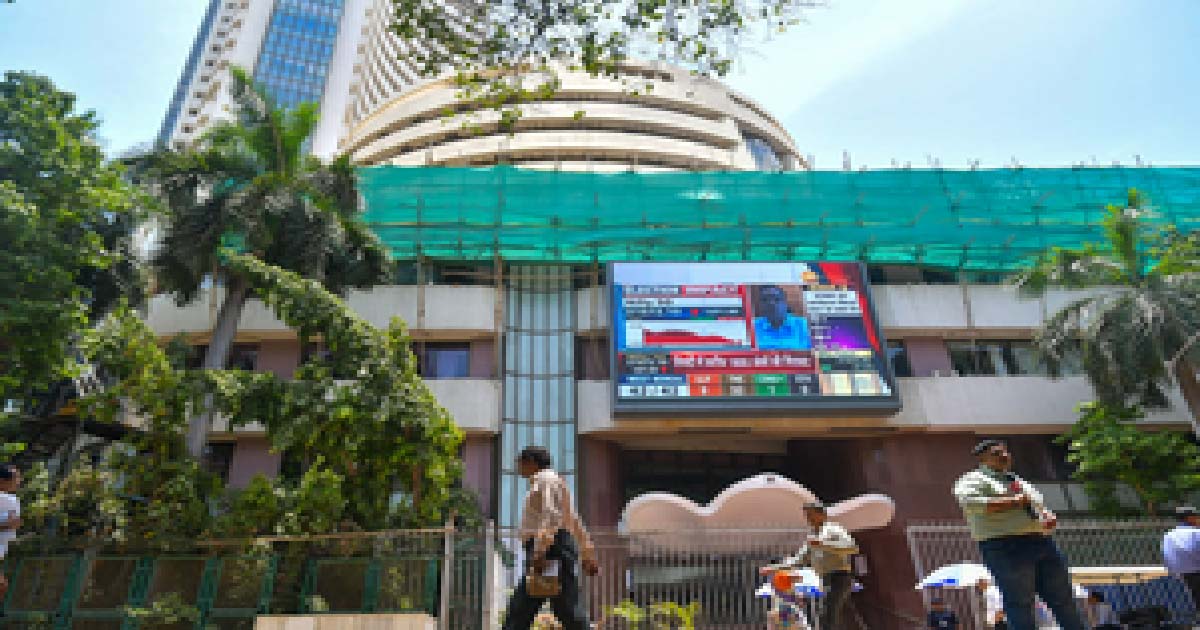Business
Goldman Sachs says Paytm’s current share price is a compelling entry point, ICICI Securities issue Buy rating

Paytm continues to get the confidence of top brokerages, who are bullish about the companys “immense growth potential”. Goldman Sachs pointed out the strong growth potential for Paytms lending business, saying the firm will hit $10 billion in disbursals by FY26E, vs $900 million in FY22.
Analysts believe Paytm’s ESOP costs will gradually reduce and are currently at par with other listed tech cos in India as well as globally ICICI Securities report said that by FY26, Paytm’s monthly transacting users are likely to double
Paytm, India’s leading digital payments and financial services, continues to get ‘Buy’ calls from top brokerages. After Goldman Sachs, BofA, Morgan Stanley and Dolat Capital, ICICI Securities has also issued a Buy rating for Paytm.
Goldman Sachs had given Paytm a Buy rating, with a target price of Rs 460 on February 7. On Monday, the investment bank reiterated its Buy rating, pointing out key notes for investors. The report said that “the current share price offers a compelling entry point into India’s largest and amongst the fastest growing fintech platforms”.
ICICI Securities has now initiated coverage for Paytm and highlighted the company’s strong growth potential in terms of target addressable market (TAM), giving a “Buy’ rating and target price of Rs 1,362.
Goldman Sachs highlighted that Paytm continues to gain market share across both UPI and non-UPI payments, besides strong growth in lending business. It said Paytm’s net payments take rate or spreads have, defined as revenue less payment processing charges (PPC) as a proportion of Gross Merchandise Value (GMV) have been improving.
“Paytm’s net payments take rate (or spreads, defined as revenue less payment processing charges as a proportion of GMV) have been improving. From 8 bps in 3QFY22, we forecast spreads to widen to 11 bps by FY26E as a result of Paytm’s scale benefits; increasing share of UPI for wallet money addition; rising share of wallet for online payments (vs in-store, which have zero MDR); and rising share of device rental revenues,” the brokerage noted.
Paytm’s ESOP costs to gradually reduce, currently at par with other listed tech cos in India as well as globally.
Goldman Sachs noted that Paytm’s Employee Stock Ownership Plan (ESOP) costs will reduce gradually and is currently at par with other listed tech companies in India as well as globally.
“We forecast ESOP charge for Paytm to be highest (at Rs 3.9 billion per quarter) for first two years (when the first tranche vests, per Paytm), and then gradually reduce over the next three years. Paytm also has about 15 million un-granted options and per our estimate, the total share count could increase by 46 million (or 7 per cent of current outstanding), if all options were to be vested/granted,” said the Goldman Sachs note.
“We note that as a proportion of total operating expenses, Paytm’s ESOP cost is not significantly different vs other global platforms such as Airbnb and DoorDash, as well as recently listed India internet peers such as Zomato and PB Fintech.”
Meanwhile, ICICI Securities in its note called out Paytm’s immense growth potential in terms of target addressable market (TAM), buoyed by its leadership position in India’s digital payments ecosystem.
The brokerage said Paytm’s digital payments business has the potential to grow strongly in future, reflecting its “sizeable two-sided digital ecosystem with proven leadership in payments”.
“Paytm is well ahead in the race of digitisation, building a robust full stack technology suite integrated across the ecosystem with distinct features, high success rates, easy user interface, and customer convenience. It has an early mover advantage in rolling out wallet, FASTag, and is ahead of the curve in (skill based) online gaming, too,” said the note by ICICI Securities.
During the October-December quarter, the company saw its revenues jump by 89 per cent y-o-y to Rs 1,456 crore, EBITDA losses (before ESOP expense) came down to Rs 393 crore from Rs 488 crore during the same quarter in the previous year.
In its latest filing with the stock exchange, Paytm had shared its highest ever growth in monthly transacting users to 68.9 million users. Now, it seems analysts are bullish about this growth momentum to continue. ICICI Securities highlighted that Paytm’s monthly transacting user base (MTUs) is likely to double over FY22-26E to more than 120 million.
Paytm had said that in Q3 FY 22, its merchant payments-led GMV stood at Rs 2.5 lakh crore. Analysts at ICICI Securities forecast that Paytm’s merchant GMV would grow at 36 per cent CAGR over FY22-26E to reach Rs 30 trillion and within this, MDR linked GMV is estimated to grow at more than 25 per cent.
The brokerage noted that Paytm’s contribution margin has potential to further improve 40 per cent-46 per cent by FY24E/FY26E.
“Aided by this contribution margin, there is some visibility of EBITDA getting into positive territory post FY26E. Adjusted EBITDA margin (excluding non-cash ESOP charges) will turn positive by FY26,” it added.
Both Goldman Sachs and ICICI Securities believe that Paytm’s lending business, in which it partners financial institutions to provide loans on its platform, has the potential to grow rapidly in the medium term.
Goldman Sachs said: “We believe Paytm will be able to continue to scale its lending portfolio, and forecast $10 billion in disbursals by FY26E, vs $900 million in FY22. Paytm has continued to add new partners for its lending products over the last few quarters, suggesting to us that lenders are finding value in this partnership.”
Paytm’s lending business witnessed record growth in January 2022, maintaining the positive trend witnessed in the Q3 FY 22 earnings. Last month, Paytm registered 1.9 million loan disbursals, marking a y-o-y growth of 331 per cent; aggregating to a total value of Rs 921 crore (y-o-y growth of 334%). This also included a staggering growth in its Buy Now, Pay Later product – Paytm Postpaid.
“For Paytm’s BNPL product, 30 per cent + of the monthly sign-ups (Dec ’21 quarter) were new-to-credit customers, helping expand the credit base for Paytm’s financial partners. Per Paytm, performance of the company’s loan portfolio has resulted in higher confidence from lenders to increase the scale of this business,” it added.
Meanwhile, ICICI Securities also shared an optimistic outlook about Paytm’s lending business, estimating 18-19 million consumers (15 per cent of MTUs), and an increasing number of merchants to avail lending products through Paytm platform by FY26E.
Sharing a medium-term outlook, it estimated the total lending business revenue to grow at 61 per cent over FY22-26E.
Business
38 Railways projects worth Rs 89,780 crore sanctioned in Maharashtra: Centre

New Delhi, Dec 20: A total of 38 railway projects (11 new lines, 2 gauge conversion and 25 doubling) of a total length of 5,098 kms and costing Rs 89,780 crore have been sanctioned in Maharashtra (as on April 1, 2025), the government said on Saturday.
During the last three fiscals — 2022-23, 2023-24, 2024-25 and the current financial year 2025-26 — 98 surveys (29 New Line, 2 Gauge Conversion and 67 Doubling) of total length 8,603 km falling fully/partly in the state of Maharashtra, have been sanctioned, it said.
“Further, construction works on the flagship High-Speed Bullet Train project have gathered momentum in Maharashtra. Now 100 per cent of land acquisition has been completed. Works on bridges, aqueducts, etc. have been taken up,” the Railways Ministry said in a statement.
In addition, platform extension work at 34 stations to accommodate 15-car EMUs has been taken up.
To improve the capacity of the rail network in the Mumbai suburban area, the Mumbai Urban Transport Project (MUTP)-II costing Rs 8,087 crore, MUTP-III costing Rs 10,947 crore, and MUTP-IIIA costing Rs 33,690 crore have been sanctioned.
To enhance passenger carrying capacity, 238 rakes of 12 cars each with doors have been sanctioned under MUTP-III and IIIA at a cost of Rs 19,293 crore. The process for the procurement of these rakes has been taken up.
With Western DFC also passing through Maharashtra, as about 178 route km of it or about 12 per cent of the overall route length, falling in the state, the ministry said that “about 76 km of this project from New Gholvad to New Vaitarna in Maharashtra has already been commissioned. Balance works have been taken up. Connectivity of WDFC to JNPT will boost the capacity to handle cargo and container traffic from the port to Delhi NCR”.
Presently, about 120 originating Mail/Express trains and about 3,200 suburban trains are handled daily in the Mumbai area.
Business
Indian indices end week in bullish tone over positive global cues

Mumbai, Dec 20: Indian equity benchmarks closed on a strong note this week, snapping a four-day losing streak amid positive global cues stemming from US inflation data.
The market ended the week in a bullish tone with Nifty surging 0.18 per cent during the week and 0.58 per cent on the last trading day to 25,966, after a softer US CPI print boosted expectations of a milder Fed stance.
At close, the Sensex was up 447.55 points or 0.53 per cent at 84,929.
Indian equities were traded in a cautious tone for most of the week, weighed down by persistent FII outflows, rupee depreciation, and heightened global uncertainties.
Further, early sessions also saw pressure from rising Japanese bond yields and expectations of Bank of Japan (BoJ) tightening, which amplified risk-off sentiment across emerging markets.
Bargain hunting and lower crude prices helped large caps drive a late rebound, trimming most of the week’s losses, market watchers said.
Broader indices also rose marginally during the week, with the Nifty Midcap100 up 0.04 per cent, while Nifty Smallcap100 was unchanged during the week. It gained 1.34 per cent at the close.
On the sectoral front, all sectors traded with a positive bias. Major contributions came from Nifty Realty, Auto, Healthcare, and Chemicals, while other sectors also posted modest gains.
Nifty has 26,200-26,300 as stiff resistance levels while 25,700–25,800 levels will act as support zone, they added.
Analysts said markets will likely maintain a cautiously positive bias in near future but remain highly sensitive to global cues.
Key drivers going forward include comments from the global central banks for the 2026 policy trajectory. While sentiment remains constructive, near-term volatility may persist amid uncertainty over trade deal timelines and the Indian rupee stability, they added.
Business
Nifty to touch 29,094 in 12 months supported by durable earnings, strong macro backdrop

New Delhi, Dec 19: India’s benchmark index Nifty is expected to touch 29,094 in one year based on long‑term valuation averages and earnings durability, a report said on Friday.
Wealth management firm PL Wealth said in the report that India enters the end of 2025 from a position of relative macro strength with record‑low inflation, a dovish monetary stance, resilient domestic demand and improved corporate earnings visibility.
“In the near term, large-cap stocks remain preferred due to their earnings stability and strong balance sheets, while selective exposure to high-quality mid-cap names is being added as visibility improves,” the wealth management firm cited its strategy.
Over the next 6 to 24 months, the earnings cycle is expected to broaden across consumption, financials, capex-linked sectors and select industrials, supported by benign inflation, lower interest rates and sustained domestic liquidity.
“India’s current macro configuration is among the most constructive we have seen in over a decade,” said Inderbir Singh Jolly, CEO, PL Wealth Management.
While global uncertainties will continue to create short-term volatility, India’s structural strengths—policy reform, financialisaton of savings and improving corporate balance sheets—position it well for sustained long-term growth, Inderbir added.
RBI’s 25 basis‑point cut to a 5.25 per cent policy repo rate lowered its CPI inflation projections and upgraded GDP growth estimates, signalling confidence in the sustainability of domestic demand, the report said.
The firm also noted FY26 GDP growth projection of 7.3 per cent underpinned by robust infrastructure spending, resilient consumption and key policy measures such as GST rationalisation and income-tax cuts.
The FY26 September quarter earnings season delivered broad-based strength, with several sectors—including hospitals, capital goods, cement, electronics manufacturing services, ports, NBFCs and telecom—reporting double-digit growth in EBITDA and profits.
The firm noted that Nifty earnings per share estimates for FY26–FY28 imply an earnings CAGR of nearly 14 per cent. Domestic institutional investors have anchored markets with record net inflows of over Rs 6.8 trillion year‑to‑date.
-

 Crime3 years ago
Crime3 years agoClass 10 student jumps to death in Jaipur
-

 Maharashtra1 year ago
Maharashtra1 year agoMumbai Local Train Update: Central Railway’s New Timetable Comes Into Effect; Check Full List Of Revised Timings & Stations
-

 Maharashtra1 year ago
Maharashtra1 year agoMumbai To Go Toll-Free Tonight! Maharashtra Govt Announces Complete Toll Waiver For Light Motor Vehicles At All 5 Entry Points Of City
-

 Maharashtra1 year ago
Maharashtra1 year agoFalse photo of Imtiaz Jaleel’s rally, exposing the fooling conspiracy
-

 National News1 year ago
National News1 year agoMinistry of Railways rolls out Special Drive 4.0 with focus on digitisation, cleanliness, inclusiveness and grievance redressal
-

 Maharashtra1 year ago
Maharashtra1 year agoMaharashtra Elections 2024: Mumbai Metro & BEST Services Extended Till Midnight On Voting Day
-

 National News1 year ago
National News1 year agoJ&K: 4 Jawans Killed, 28 Injured After Bus Carrying BSF Personnel For Poll Duty Falls Into Gorge In Budgam; Terrifying Visuals Surface
-

 Crime1 year ago
Crime1 year agoBaba Siddique Murder: Mumbai Police Unable To Get Lawrence Bishnoi Custody Due To Home Ministry Order, Says Report














